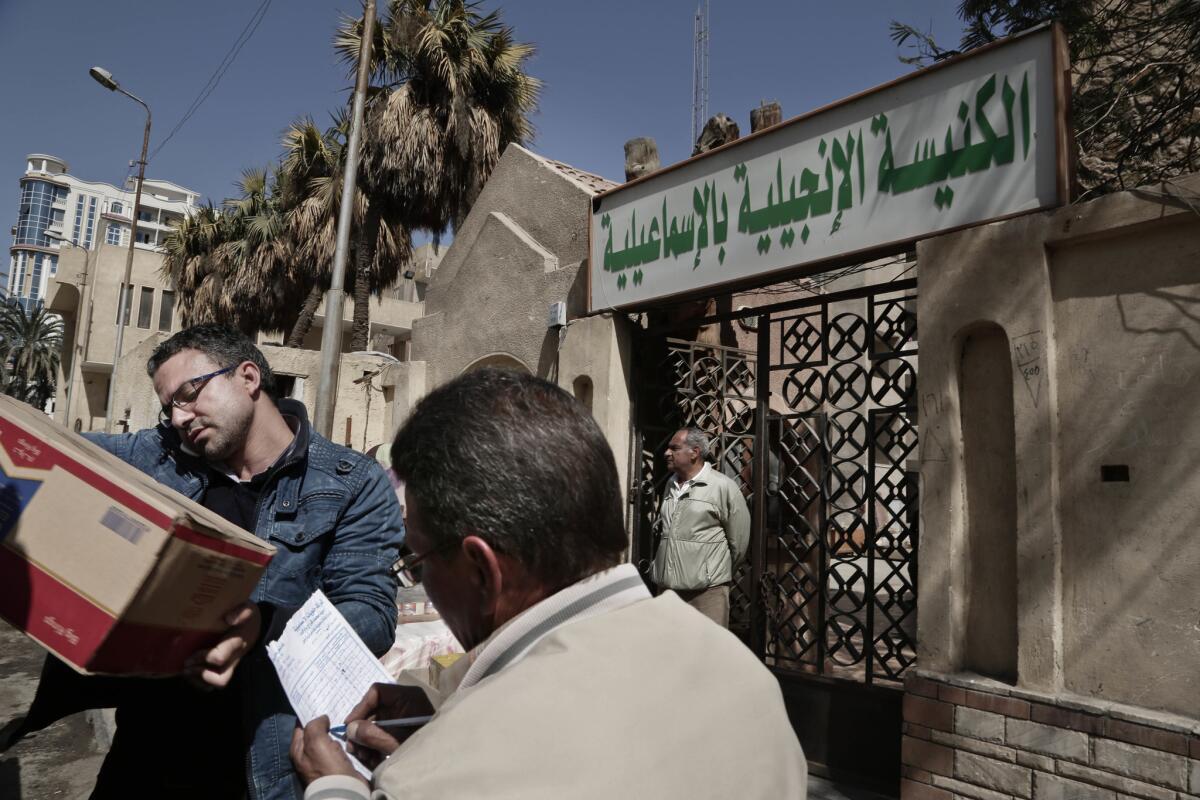Egyptian Christians flee Islamic State violence on Sinai Peninsula

- Share via
Reporting from ISMAILIA, Egypt — Some fled with little more than the clothes they were wearing, terrified that the militants of Islamic State would come for them next.
For a fourth day on Sunday, Coptic Christians — one of Egypt’s most vulnerable minorities — sought safe haven after a series of sectarian killings in and near the town of El Arish, in Egypt’s rugged Sinai Peninsula.
About 95 families have arrived in the Suez Canal city of Ismailia, church officials said. Frightened, hungry and tired, they are being sheltered in private homes and — belatedly — at government accommodations in Ismailia, 75 miles east of Cairo.
“There were many killings and threats of further violence,” said Kirollos Ibrahim, a priest at the Coptic Church of Ismailia, which has aided the displaced. “God has helped us, and we are finding brothers and sisters to stand by us.”
Some of those who fled El Arish said Muslim neighbors had helped shield them from “terrorists,” hiding them in their homes or helping them find other shelter.
“I was too scared to sleep, and spent the night at my Muslim friends’,” said a homemaker who asked to be identified only by her nickname, Um Mina, or mother of Mina, because she was afraid of being targeted for further violence.
“They insisted — they said, ‘We’ll take you in; anything that happens to you happens to us.’”
Um Mina, who had lived in El Arish for 17 years, said the militants “kill the men and leave the children. Then they burn the house, so they make sure we have nothing to go back to.”
She and others said the extremists — sometimes masked and driving pickup trucks flying Islamic State’s black flag — distributed threatening pamphlets in Coptic areas of the town. The militants seemed to have detailed information about Coptic families, including men’s names and home addresses, she said.
The latest attack on the beleaguered Coptic minority has raised questions as to whether the government of President Abdel Fattah Sisi is doing enough to protect them. Copts were targeted in a devastating Christmas-season bombing of a major church in Cairo.
Some of the displaced Copts said they thought the government was doing its best to help. But a teacher named Maher, who said an uncle and a cousin were killed last week by militants, said he believed the security forces had been infiltrated by extremists.
The slain men, whom he identified as Saad Hakim and his son Medhat Saad, lived only about 500 yards from a security checkpoint, the teacher said. Militants killed the pair and then ransacked the house, looting valuables like home appliances, he said. His relatives’ bodies were burned, he said.
“There is simply no security,” said Maher, who asked that his last name not be used because he feared for his life.
Youssef Shokry, another priest at Ismailia’s Coptic Church, said donations of cash and supplies like mattresses and cooking utensils were helping authorities cope with the influx — at least for the moment. For the longer term, he is uncertain.
“Some families have said they will never return; others say they do want to go back home once it’s safe,” the priest said. “We still don’t know what will happen.”
After initial difficulties in finding accommodation, some of the fleeing families were sheltering at a former youth hostel in Ismailia, an arrangement brokered by Christian leaders and a government ministry. Two doctors were offering medical services, and clerics from other Christian denominations arrived in a show of solidarity.
The northern Sinai Peninsula has long been the scene of a simmering Islamist insurgency, but Islamic State fighters have dramatically raised the level of violence over the last three years. The militants consider Sinai to be one of the group’s self-proclaimed “provinces.”
The Copts of El Arish have been terrorized by a series of brazen killings — at least seven in recent weeks. The latest victim was a plumber who was shot dead in his family home Thursday as helpless relatives looked on.
Islamic State has not issued a claim of responsibility for the killings, but it released a video last week saying that Copts — whom it regards as infidels — would be targeted. The group claimed responsibility for December’s Cairo church bombing.
Previously, Islamic State militants had focused their attacks on military installations and security forces. But now the group has turned to soft targets — such as the Copts, whose numbers in northern Sinai have been rapidly shrinking over the last five years.
Coptic Christians, thought to make up about 10% of Egypt’s population, were officially protected under the rule of President Hosni Mubarak, who was forced from power six years ago. When Islamist President Mohamed Morsi was ousted in a 2013 coup, many of his followers believed the Copts had colluded in his downfall, and launched a concerted campaign of revenge attacks.
Egypt’s indigenous Copts are one of Christianity’s oldest branches, dating to the 1st century. But they have long suffered from persecution and discrimination.
Some of those who fled the violence in El Arish said they hoped to return, but did not know when it would be safe to do so. A native of El Arish nicknamed Um Marmar said they feared Ismailia was already overburdened by those who had fled, as she and her family did.
“The city’s infrastructure cannot contain all these families,” she said. “And more are on the way.”
Special correspondent Medhat reported from Ismailia and Times staff writer King from Washington.
UPDATES:
12:25 p.m.: This story was updated with staff reporting throughout.
This story was originally published at 10:55 a.m.
More to Read
Sign up for Essential California
The most important California stories and recommendations in your inbox every morning.
You may occasionally receive promotional content from the Los Angeles Times.










